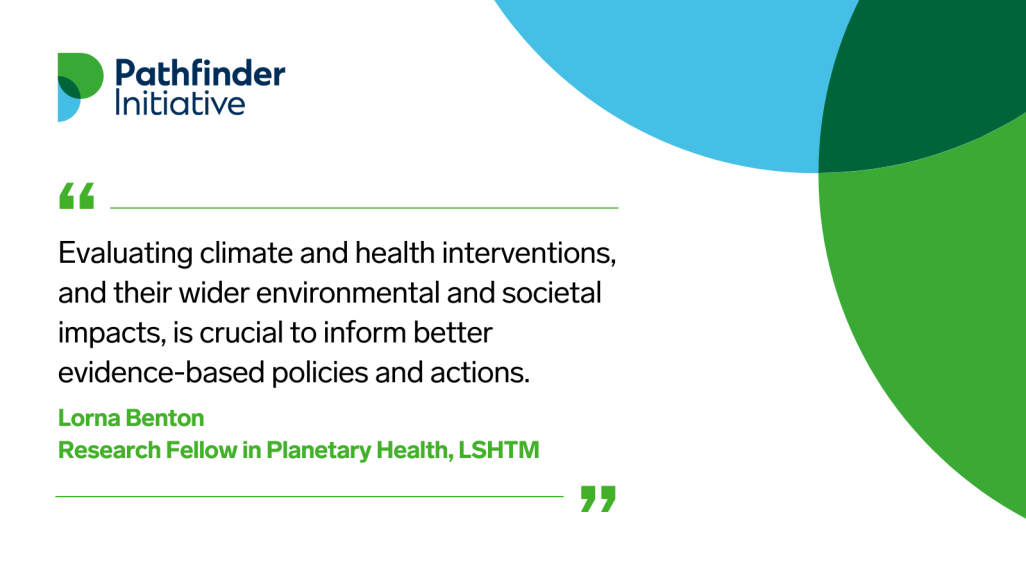Experts from the Pathfinder Initiative call for updated guidance to assess complex interventions for climate and health using a planetary health perspective.

Growing evidence highlights the links between climate and health, but stronger guidance that considers connections between natural and human systems is needed to inform the evaluation of interventions with climate and health goals.
In a new paper, published in the BMJ, researchers from the Pathfinder Initiative research team at the London School of Hygiene & Tropical Medicine (LSHTM) make the case for updated guidance that strengthens consideration of the wider system in the design and evaluation of policies and actions that address climate and other environmental and health challenges.
Complex interventions for climate and health may have a range of impacts and interacting components. For example, an intervention may have a primary aim to mitigate climate change, such as by reducing energy dependency on fossil fuels through transitioning to renewable energy, but will also bring wider environmental benefits and benefit health through reduced air pollution.
Trade-offs are another important consideration – a switch to biofuel production for example, could put additional pressure on biodiversity, land use and freshwater systems, as well as impacting food security, air pollution and livelihoods for Indigenous or low-income communities, depending on factors such as the crops chosen.
Another example of a complex intervention for planetary health would be one with the primary aim of improving health outcomes that also has environmental benefits, such as improving the diagnosis and management of asthma cases and chronic obstructive pulmonary disease (COPD), in turn reducing the use of inhalers that emit high levels of greenhouse gas (GHG) emissions and reducing pharmaceutical waste and plastic pollution.
The authors argue that a planetary health perspective provides a holistic way of addressing health and environmental problems and understanding the impact of interventions in different domains. It places considerations for health and equity at the forefront when assessing the impact of an action. As such, it also draws on a range of mixed and complementary methods for credible evaluation design.
Planetary health is defined as “the health of human civilisation and the state of the natural systems on which it depends”, and recognises the connections between different earth systems. There is growing awareness of the impact of human activities on natural systems, in particular relating to climate change, but action is not yet happening at the rate or scale needed. Evidence from the Pathfinder Initiative shows that climate action can bring major health benefits in the near-term in addition to reducing future climate risks. While this can help win support for more ambitious action, most existing evidence is from modelling studies showing potential health benefits.
The Pathfinder Initiative Climate & Health Evidence Bank showcases examples of implemented climate solutions with measured health benefits, such as home energy efficiency upgrades in Australia which improved the physical and mental health of householders; transitioning to renewable energy in the US which reduced premature deaths from air pollution; and active travel interventions in cities in New Zealand and in Buenos Aires which helped to increase physical activity. But more robust evidence of the impact of real-world actions is needed to inform effective responses to environmental and health crises, leverage opportunities and minimise unintended negative consequences.
To address this evidence gap, the researchers provide a practical checklist, adapted from the Medical Research Council guidance for public health and informed by research findings from the Pathfinder Initiative, to support the design and evaluation of climate and health interventions using a planetary health perspective. The authors highlight the need for researchers and practitioners to use this guidance to: better define the intervention context and wider system; consider health, social and environmental factors; define intervention objectives for health and natural systems, as well as considering potential unintended outcomes; identify indicators and credible methods for monitoring and evaluation; and report on implementation and scalability.
Dr Lorna Benton, Research Fellow in Planetary Health at LSHTM and lead author of the publication, said: ‘Evaluating climate and health interventions, and their wider environmental and societal impacts, is crucial to inform better evidence-based policies and actions. Our checklist incorporates a planetary health perspective to improve understanding of wide-ranging benefits and trade-offs for health and the environment, as well as risks to vulnerable communities.’
This is a first iteration of the checklist which will require further discussion and engagement from researchers, funders and evidence users. Alongside this work, guidelines are also under development for the modelling and reporting of health outcomes and greenhouse gas emission reductions from climate mitigation actions, to improve and harmonise the evidence base for action.
Publication:
Benton, L. et al. Need for planetary health perspective in guidance for complex interventions for climate and health. BMJ. https://doi.org/10.1136/bmj-2024-083337
Further resources:
Ebi, K. et al. Considerations for improving the relevance, use, and robustness of projections of the health risks of climate change. The Lancet Planetary Health. https://doi.org/10.1016/S2542-5196(25)00089-0